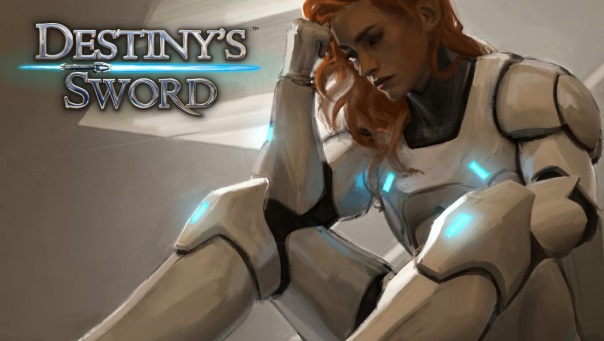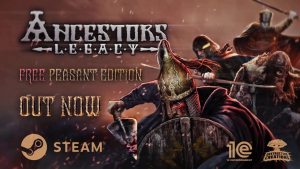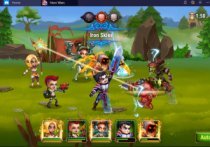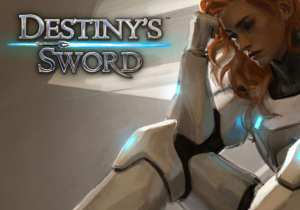Destiny’s Sword – Interview with Ken Hall

Destiny’s Sword is an upcoming tactical strategy RPG with a serious focus on mental health, which is pretty ground-breaking. This is an important topic, especially in the military world. Combat takes a very real toll on people’s mental health, and it is not always discussed/handled in a positive way. I recently spoke with Ken Hall of 2Dog Games about Destiny’s Sword and it’s focused on Mental Health. It’s an important topic, and it feels to me like they’ve broached it in a positive way, so I’m very excited to see what comes of the game. They have also officially begun their Kickstarter, which is linked below.
Jason: Mental health and mental illness are very important issues, and are seldom addressed in games in a healthy manner. What inspired you guys to focus on this topic?
Ken: Back in the early 2000s, I made the award-winning flight sim B-17 Flying Fortress: the Mighty 8th. Part of my role on the project was to liaise with the veterans and research their experiences. It became obvious early on that most of the books and films about the war only talked about the few seconds per mission when the crews were pulling the triggers. They were not exploring how the men kept themselves and each other going in a foreign theatre for years on end, or how they got back onto the aircraft after getting wounded or losing their friends.
Inspired by these stories, I went on to compile an audiobook of the experiences of British Sherman tank veterans from World War II. During the course of interviewing these gentlemen in their 80s, I learned that some of them still woke up on their bedroom floors in terror, “trying to get out of their burning tanks”. The scars of combat and trauma can last a lifetime, and as a team, we felt that our entertainment should do a better job of depicting these long term effects. In Destiny’s Sword, we saw an opportunity to explore some of these consequences in a way that raises the profile of mental health for everyone.
Jason: The experiences your characters have in battle will take a toll on their overall mental health, which I think is interesting. Does this mental health toll vary depending on how you perform in combat?
Ken: Winning and losing will affect your troops’ morale, but bigger factors will be things like seeing a teammate get injured, and the players’ choice of action/inaction during combat.
Each character has a unique personality that will influence the way they perceive their experiences, so two different characters may not feel the same way about a certain event. Finally, a character’s personality, combined with their previous experiences, can make them either more vulnerable or more resilient to various stresses. This means that in Destiny’s Sword, prevention can be worth more than the cure!
Jason: What sort of research into PTSD/military mental health issues did your team look into over the course of development?
Ken: It’s really important to us that we contribute positively to the conversation around mental health, so we wanted to make sure we avoided dealing with these conditions in a stereotypical fashion. We’re working closely with the clinical psychology team from Take This (a games based mental health charity) along with veterans from Spartan Wellness and Soldier On (two veterans support organizations). We’ve also worked with the Alda Communication Training team, who are helping us to improve our ability to generate emotional engagement with our characters and develop empathy for their conditions.
Jason: Since players are rewarded for empathic choices, instead of being penalized for their mistakes in social interaction, what happens to a character if they constantly pick negative choices (if those are an option at all)?
Ken: We felt we had to allow players to make mistakes, to give them a chance to learn and choose the right path, rather than simply being led down it. If a player continues to make negative choices, they will not progress as quickly and their team will not perform as well. This is never an unrecoverable situation, and winning is not the be-all and end-all of the game, but the more a player learns how to help their characters, the more success they are likely to have.
Jason: What sorts of challenges did your team come across while developing Destiny’s Sword, combining the need for mental health awareness combined with a tactical combat game?
Ken: As a small indie studio, we have a limited budget and have to start with a narrow scope, but we will continue to broaden the game throughout its future development. Although we deal with some serious issues, Destiny’s Sword is a game first, and that means we want it to be fun. Many daily events for characters are positive experiences, and players are rewarded for empathic interactions with their characters and other players, rather than penalized for their mistakes. This provides a safe and fun environment to learn and develop useful communication and management strategies.
We also wanted to make sure we weren’t adding to the stigma that all mental health issues are major psychotic breaks, or that those suffering are unstable or dangerous. Most of the time in Destiny’s Sword, mental health is just something you help your team manage, as their equipment or ammunition. It doesn’t define them, you just have to take it into account.
Jason: What message do you hope players pick up while playing Destiny’s Sword?
Ken: There are two takeaways that we really want players to pick up on. The first is that we all suffer from some aspect of mental health from time to time. It’s nothing to be ashamed of, it’s not a sign of weakness, and it’s important to reach out for help when we need it. The second takeaway is that the single most important factor for building resilience and supporting recovery is the community. Simply put, we’re stronger together. We want our players to develop successful strategies for positive social interaction and inclusion.
Jason: What sort of expertise in the mental health field do you have on your team, and will they continue to play a role after Destiny’s Sword goes live?
Ken: See #3 and absolutely!
Articles You May Enjoy
- Age of Wushu: Peach Blossom Island Sect Revealed
- Age of Wushu introduced a new hidden Sect (class), Peach Blossom Island for the upcoming expansion Tempest of Strife.
- Digital Extremes Announces Warframe
- Digital Extremes, known for Unreal, Bioshock, and more, has announced the free-to-play Warframe.
- E3 2012: MMOHuts/OnRPG Day Two Recap
- OnRPG and MMOHut recap their day two experiences at E3 2012.












